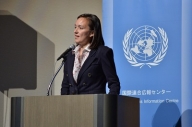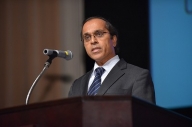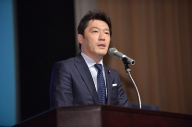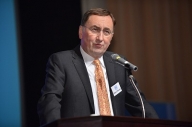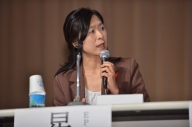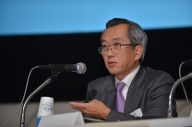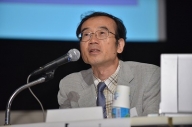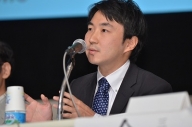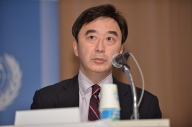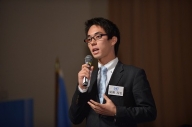Post “Rio+20”: Achieving The Future We Want – In Commemoration of United Nations Day 2012
2012.11.02
UN Day 2012 was commemorated in Tokyo with a public forum entitled “Post ‘Rio+20’: Achieving The Future We Want.” The event took place at the United Nations University (UNU) headquarters in Tokyo and was organized by the UN Information Centre (UNIC), UNU, and the Environmental Partnership Council (EPC), with cooperation from the Global Environment Outreach Centre (GEOC) and the support of entities including the Japanese Ministry of Foreign Affairs. The conference was open to the public and attended by an audience of 170 that included many nationalities and wide-ranging age groups.
Moderating the forum was Ms. Mari Yamashita, Director of UNIC Tokyo. Opening remarks were made by UNU Vice-Rector Govindan Parayil, who emphasized the continued relevance of the UN and the importance of carrying on the work of Rio+20 to address the challenges of today’s world. UN Secretary-General Ban Ki-Moon participated in the form of a video message.
Mr. Naoki Kazama, Parliamentary Vice-Minister for Foreign Affairs of Japan, was the final speaker in the opening portion of the forum. He assured the audience of the Japanese government’s commitment to building an environmentally secure and sustainable society in Japan, and to promoting the development of the same in other regions of the world.
The keynote speaker of the day was Mr. Janos Pasztor, Executive Secretary of the UN Secretary-General’s High-level Panel on Global Sustainability (GSP). Mr. Pasztor reviewed the role played by the UN in the past in promoting sustainable development, describing the history of its past commitment to environmental issues and outlining the problems it faces in the near future.
The UN does indeed play a much needed role in today’s world, Mr. Pasztor said, but then posed the question: “Is the UN ready for the task?” “No, it is not ready,” he answered. But he went on to maintain that it can and will make itself ready.
The next few years are especially important as 2015 is the target year for the Millennium Development Goals (MDGs) established in 2000. The MDG initiative is considered a general success, particularly in its effort to eradicate poverty, but much remains to be done, especially with regard to sustainability. A new set of Sustainable Development Goals (SDGs) is needed to carry on the MDG agenda.
The SDGs were initially proposed in early 2011 by the High-level Panel on Global Sustainability in its final recommendations. It was agreed that they should be universal goals that address all nations, and that they must address all three aspects of sustainable development: environmental, economic and social. Furthermore, like the MDGs, they should be limited in number, easy to understand, and focused on clearly achievable goals.
The SDGs were a focal point of the Rio+20 Conference in June. While specific goals were not established, it was decided that a small working group of 30 nations (G30) would undertake the task of formulating a list of goals. The year 2013 will be a key year, when a special session of the UN General Assembly convenes to discuss the issue and Member States begin to organize themselves towards a post-2015 framework.
Mr. Pasztor remarked that the UN itself also needed to change, in order to work more effectively toward a sustainable world—by improving cooperation among its many agencies, and by working better with the private sector and with the peoples of the world.
* *** *
The second half of the forum started with the main event of the day, which was a panel discussion by four panelists representing major stakeholders. Ms. Tomoko Hoshino, Vice-President of Environmental Partnership Council (EPC) moderated the session, and Mr. Pasztor joined the discussion as a commentator. The panelists shared their experience at Rio+20, and exchanged opinions on how the SDGs should take form going forward.
Mr. Hiroshi Minami, who represented the Ministry of Foreign Affairs, outlined the Japanese government’s efforts at Rio+20 in which he participated as a government negotiator. He acknowledged that the civil society in general considered the outcome of the conference disappointing. But he also underlined the fact that agreeing on the SDGs was the largest achievement of Rio+20, and in order to make this process a success, it was worth considering a mechanism in which the government could receive timely and adequate input from the civil society before entering into intergovernmental negotiations.
On behalf of the civil society, Mr. Koyu Furusawa from Japan Center for a Sustainable Environment and Society (JACSES) pushed for a new framework which would combine the government, companies and citizen/community. The integration of environmental and developmental objectives has been a long-term challenge which remains unsolved 20 years after the Rio Earth Summit in 1992, he pointed out, and suggested that the civil society could play a larger role if such new framework were to be put in place.
Youth organizations showed a very active presence at Rio+20. According to Mr. Hiroki Fukushima from Japan Youth Ecology League, the “Youth Blast,” or Conference of Youth, attracted the participation of more than 1,200 youngsters. Through lobbying, members were able to draw the diplomats’ attention to the issues that mattered most to the youth, he recalled, and hoped that in negotiating the SDGs, the importance of narrowing the gap between generations would be taken into account.
From the business side, Mr. Tsukasa Kanai who is in charge of CSR at Sumitomo Mitsui Trust Bank talked about the activities of the United Nations Global Compact (UNGC) at Rio+20. UNGC hosted “Corporate Sustainability Forum” which enjoyed more than 2,700 participants from more than 100 countries. Kanai called the event “a huge success” drawing attention to the fact that more than 200 initiatives were born as a direct result. He emphasized the commitment of the business community to further their efforts in resolving global issues in partnership with other stakeholders.
Numerous questions and comments were received from the audience via feedback papers and Twitter, and the panel further engaged in active discussion responding to those questions.
After two hours of active discussions, the event concluded with a closing message from Mr. Shoya Hirose, a youth representative from Climate Youth Japan (CYJ). He stressed the necessity of listening to the voices of the youth at the international level, and that the words “partnership” and “participation” should be included in the SDGs. “The resolve of people around the world will transcend age and national boundaries,” he said, and called out for support in fostering dialogue among all parties involved for a better future.
– Fact Sheet
Rio+20 and Beyong: Moving Forward to a Sustainable Future
Post_Rio+20_fact_sheet_English.pdf
* *** *
